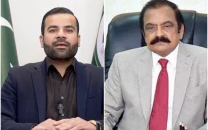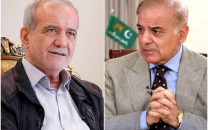Lawyers, politicians unite against anti-democratic moves
Join hands to protect 18th Amendment, prevent presidential form of govt

PHOTO: FILE
The Asma Jahangir Legal Aid Cell (AJLAC) and the Pakistan Bar Council (PBC) held a dialogue with parliamentarians on Friday for the implementation of laws that protect fundamental rights and formed a committee for the purpose.
The PBC was represented by its Vice Chairman Syed Amjad Shah, Executive Committee Chairman Hafiz Mohammad Idris and Human Rights Committee Chairman Abid Saqi.
Nida Aly, Afrasiab Khattak and Munizae Jahangir attended the dialogue on behalf of the AJLAC.
Sindh wrests power to appoint CM’s advisers from governor
Pakistan Peoples Party (PPP) Chairman Bilawal Bhutto Zardari, senators Mushahidullah Khan, Sherry Rehman, Mustafa Nawaz Khokhar and Usman Kakar, MNAs Mohsin Dawar, Shaista Pervaiz, Nafeesa Shah and Chaudhry Manzoor and senior politician Farhatullah Babar participated in the event.
Government representatives were also invited to the dialogue, but none of them showed up.
The purpose of the consultation was to engage parliamentarians and the legal fraternity for a way forward on the recommendations that emerged from the Asma Jahangir Conference Justice for Empowerment 2018.
A consensus was reached that challenges to the 18th Amendment and the desire to roll back provincial autonomy and entitlements granted by the 18th Amendment as well as by the 1973 Constitution generally – including the National Finance Commission (NFC) Award -- must be resisted.
President Alvi hints at changes in 18th Amendment
They agreed that the 19th Amendment related to Article 175-A (appointment of judges to the superior judiciary) must be repealed.
The also reached on consensus on the following matters: the role of the parliamentary committee in appointments to the superior courts must be revived.
Military courts, a parallel justice system, impede access to justice and do not meet standards of fair trial. They should not be extended as they are given jurisdiction over civilians and used against them. The criminal justice system should be strengthened instead.
The state must fulfil its responsibility to protect the fundamental rights of citizens.
The harassment of human rights defenders should be stopped and the ban on international and local non-governmental organisations must be lifted.
Bilawal warns Centre against bulldozing 18th Amendment
The government should implement the legislation to criminalise enforced disappearances.
The government must prevent torture by adopting a 2014 bill passed by the Senate.
The commission on missing persons must prosecute the 153 identified officials responsible for enforced disappearances.
There should be an effective implementation of the merger and reforms in western districts of Khyber-Pakhtunkhwa (K-P) (erstwhile tribal areas) as approved by the parliament.
It is important that transparent and fair elections to the K-P Assembly in the western districts take place.
The women in the merged districts should be given representation in the National Commission for the Status of Women and included in the reform process.
Transparent and fair local government elections should be held in merged districts.
18th amendment: anomalies abound
The appeasement of religious fundamentalism must end and all minorities must be protected in the face of new threats, especially the Hazara community in Balochistan.
The National Action Plan should be expanded and implemented in letter and spirit. There should be effective legislation and enforcement of laws against forced conversions.
The legal age that defines a child should be uniform. The legal marriage age for girls should be 18 years in all provinces (Sindh is the only province where the legal age for marriage is 18).
A bipartisan effort should be made to legislate on the legal age for marriage in the provinces and Islamabad.
Freedom of expression must not be curtailed and unannounced censorship in print and electronic media must be lifted.
The parliament must approve a new bill for the independence of the Pakistan Electronic Media Regulatory Authority (Pemra) according to the recommendations of the media commission report.
Parliament must approve a journalist safety bill which was moved in the previous parliament.
Judges, lawyers and the cyber-crime wing of the Prevention of Electronic Crimes Act must be imparted training in cyber laws. The parliament should review the laws to remove the draconian provisions of the cyber crime law.
There should be enactment of the data protection law which covers all public bodies including the National Database and Registration Authority and Safe Cities.
When formulating legislation, all stakeholders must be involved.
The law on sexual harassment against women in workplaces is not being implemented and both the federal and provincial assemblies have not constituted committees on sexual harassment as mandated by the law.
The federation and the provinces must collectively ensure that the curriculum is devoid of hate material and derogatory material with respect to minorities.
The Transgender Act 2018 must be implemented in letter and spirit. It was recommended that a monitoring body for the implementation of current protection laws for the transgender community should be established.



















COMMENTS
Comments are moderated and generally will be posted if they are on-topic and not abusive.
For more information, please see our Comments FAQ